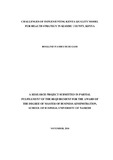| dc.description.abstract | The social pillar for Vision 2030 indicates the need to improve the overall livelihoods of
Kenyans, through provision of efficient and high quality health care systems with the best
standards. As a long term target, quality excellence in the health sector is envisaged to be
achieved through the implementation of KQMH. However most hospitals have recorded
challenges in the implementation of this strategy. The purpose of this study was to
determine the challenges of implementing Kenya Quality Model for Health strategy in
Kiambu County, Kenya. The study was guided by the following two objectives: to
determine the challenges of implementing Kenya Quality Model for Health strategy in
Kiambu County, Kenya and to determine the strategies adopted to counter the challenges
of implementing Kenya Quality Model for Health strategy in Kiambu County, Kenya.
The study adopted a descriptive cross sectional survey. The target population comprised
one level 5 public hospital and seven level 4 hospitals in Kiambu County. The study used
both primary and secondary data. Primary data was collected using a questionnaire.
Quantitative data collected was analyzed by the use of descriptive statistics analysis such
as means, standard deviations and frequencies. The study established that hospitals face a
number of challenges that affect the implementation of the Kenya quality health model to
a great extent which included: inadequate funding, communication within the facility,
limited qualified personnel to implement KQMH and responsibility level of employees at
the facility. On the strategies the study concluded that all hospitals have adopted
strategies to mitigate the effects of the challenges faced in the implementation process.
The study recommended that the management of these hospitals and the county
government should liaise and source for extra funding since they are referral hospitals
and thus its paramount for them to have all the needed resources. The study also
recommended that the county government allocate more funding to the level four and
five hospitals so as to ensure effective running and availability of the medical resources
needed. On the strategies, the study recommended that the management of the hospital
takes up the responsibility of frequent training of the medical personnel on the
implementation of KQMH. | en_US |

